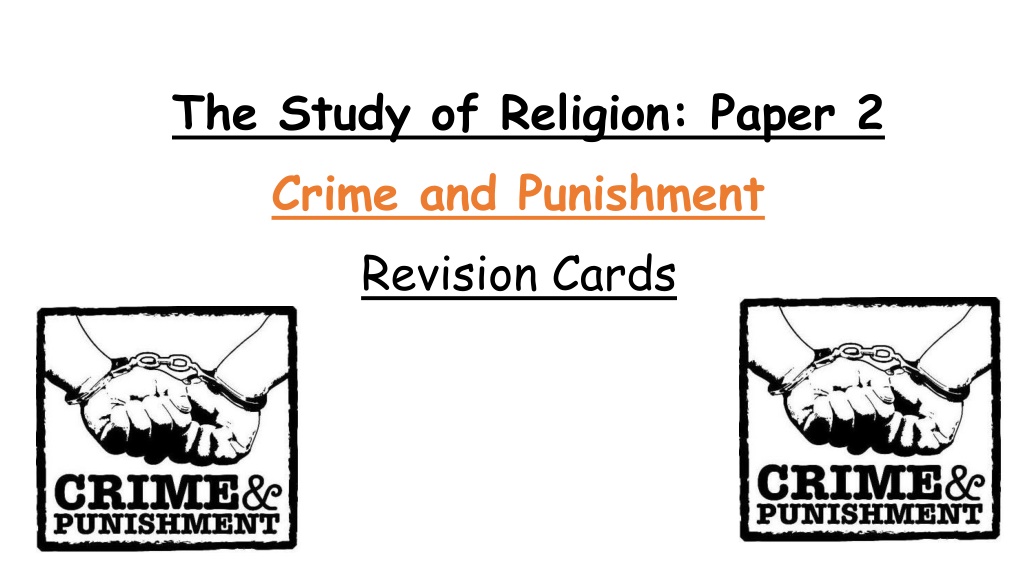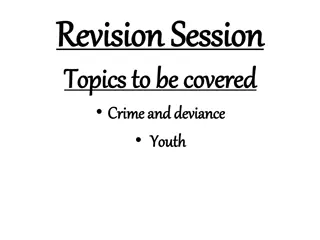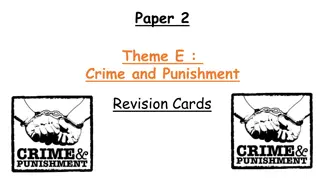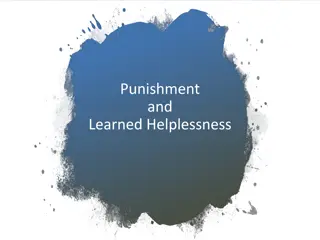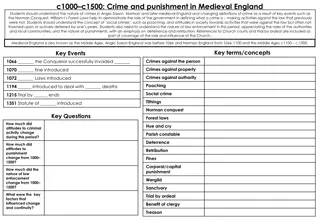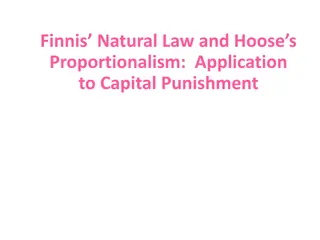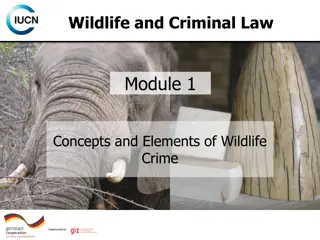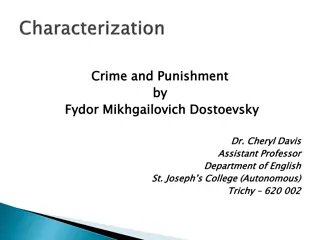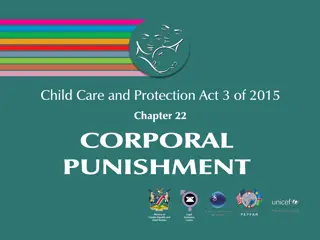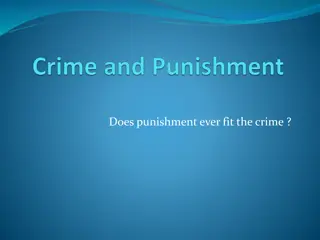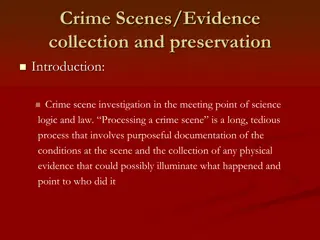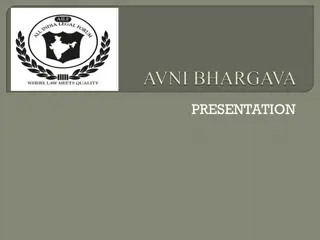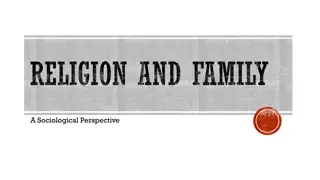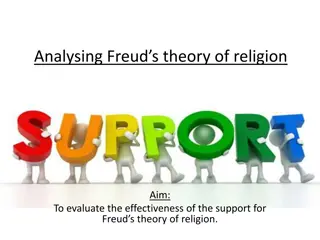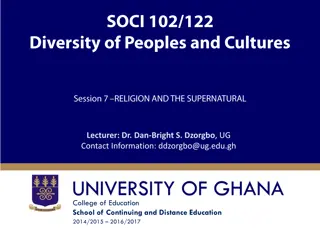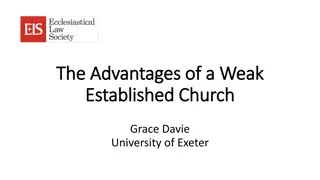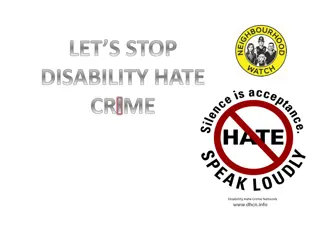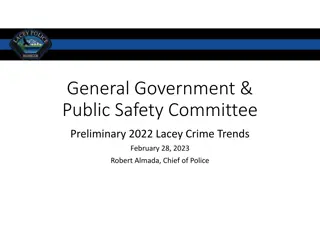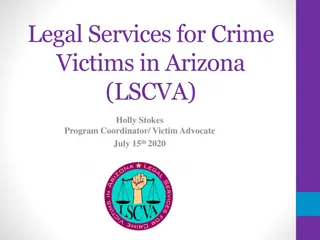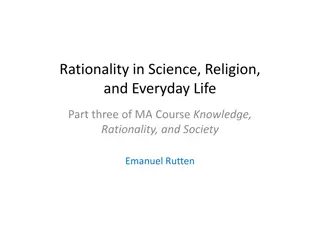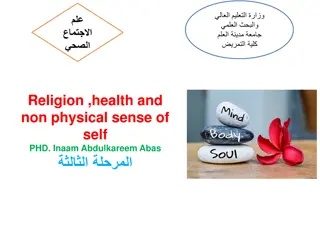Exploring Crime and Punishment in Religion: Key Insights and Perspectives
Delve into the study of crime and punishment within the framework of religion, examining perspectives from Christianity and Islam. Understand the concept of evil, the reasons behind criminal behavior, and the nuances of sentencing based on religious beliefs. Explore how mental illness, poverty, upbringing, addiction, greed, and hate can intertwine with religious teachings on morality and justice.
Uploaded on Sep 30, 2024 | 0 Views
Download Presentation

Please find below an Image/Link to download the presentation.
The content on the website is provided AS IS for your information and personal use only. It may not be sold, licensed, or shared on other websites without obtaining consent from the author. Download presentation by click this link. If you encounter any issues during the download, it is possible that the publisher has removed the file from their server.
E N D
Presentation Transcript
The Study of Religion: Paper 2 Crime and Punishment Revision Cards
Crime and Punishment Crime and Punishment A crime is any action which is against the law. Offenders found guilt by a court face a legal punishment. Most serious offences include murder and rape which carry a life sentence (25 years) Under no circumstances can the UK impose a sentence intended to cause physical harm (corporal punishment) or the death penalty. In some parts of the world the death penalty is permitted. Civil law- Disputes between individuals or groups. E.G. Divorce, disputes between landlords and tenants and disputed wills. Usually dealt with in small claim courts and some more serious cases will go to Crown Court. Christian Views Muslim Views Christians believe there is no such thing as an evil person. Humans are not perfect and make mistakes. Original sin means that all humans have a tendency to commit evil. Muslims believe there is no such thing as an evil person. It can be linked to Iblis tempting Adam and Eve to sin against God. Evil and wicked things in life are a result of someone giving into Iblis temptations. Humans are not perfect and do make mistakes Under Shari ah law the severity of a punishment is related to the seriousness of the religious value that had been breached by the crime. Shari ah law puts great emphasis on the beliefs and intentions of a person, and even if you have thoughts of committing a crime, it is considered as serious as committing the crime itself. Good and evil actions and intentions Some actions are good but are not specified in the law- E.G. generosity, charity and love. Many Christians and Muslims argue that although some actions such as adultery are legal, they are still wrong. Evil actions cause suffering, injury or possible death. Some actions are considered evil even know they are not against the law. Evil is linked to Satan but sometimes it can link with being immoral rather than being linked to the devil. Intentions can determine how sever the punishment should be. Some argue that intention is not as important as the impact of the crime.
Reasons for Crime Mental Illness Reason for crime How? Poverty Upbringing Addiction Greed Hate Opposition to an unjust law Laws that are biased or prejudice or that breaches basic human rights is wrong and should be changed. Example, Martin Luther King, Rosa Parks, The Suffragettes. Protests must be peaceful and not cause violence. Against discrimination. Cannot afford the necessities of life. Stealing for essentials that they cannot afford to buy. Growing up in home where crime is a way of life. Parents might encourage them. Knowing right from wrong. Kleptomania is a mental conditions that makes people steal. Anger management may lead to violence Sentencing can give them the help they need. Addicts may resort to stealing to get what they need. Alcohol can make people loose control of their thoughts. Wealth and possessions can be seen as a sign of status. Greed can lead to crimes such as theft or fraud Can lead to violence or aggression towards whoever or whatever the offender hates. Christian views Christians condemn stealing. Should help one another so they do not need to steal. If Christians don t dig deep and generously open up their wallets, they do not have genuine faith. Pope Francis Let everyone be subject to the governing authorities, for there is no authority that which God has established. Should get help for their illness but also have the punishment they deserve. Alcohol is not forbidden but drunkenness is a sin and no denomination encourages excessive dinking. The 10 commandments says do not be jealous of what others have Envy is seen as one of the 7 deadly sins. Hatred is against Christian morality Muslim views Zakah is in place to help them. Muslims hope that community support will prevent Muslims turning to crime. Muslims place emphasis on a strong extended family and that they should bring children up to follow the law. Should get help for their illness but also have the punishment they deserve Muslims forbid the taking of illegal drugs and alcohol. They believe that they are temptations which will lead people to do wrong. Competing for more distracts you until you go into your graves Hatred is against Muslim morality Shari ah law is God s law and therefore cannot be unjust. Against discrimination.
Attitudes to lawbreakers and different crimes Religious views to lawbreakers Christian Views Muslim Views Attitudes to types of crime Murder Both are against people committing crimes. God has made it clear that Shari ah law had to be obeyed and so should any just and fair laws in non-Shari ah counties. All are presumed innocent until proved guilty. If they are found innocent they are able to resume their normal life without any punishment. Punishments under Shari ah law are severe but they do not apply in the UK. Lawbreakers have rights that should be protected, even while they are being punished. Christians believe that the offended should be helped so they do not offend again. The parable of the sheep and goats shows that we should treat prisoners with compassion. For I was in prison and you came to visit me. Christians believe that inhumane treatment of offenders is wrong. God commands justice and prohibits wrongdoing, and injustice. - Qur an Condemned by Christians Jesus taught Love thy neighbour Thou shalt not kill Hate crime makes a society without discrimination impossible to achieve. God created all humans equal Jesus taught Love thy neighbour There is neither Jew nor Gentile, male nor female, you are all one in Christ Jesus. Christians are sympathetic towards people committing theft our of need rather than greed. The needy should be cared for by the community, so they have no reason for resorting to crime. Treat others how you want to be treated. Against God Thou shall not kill To kill one is to kill all mankind. God created humans with equal value and none is inferior to others. Hate crime makes a society without discrimination impossible to achieve. Islam- means peace. Hate Crime Theft Muslims are sympathetic towards people committing theft our of need rather than greed. The needy should be cared for by the community, so they have no reason for resorting to crime. Shari ah law classifies crimes into four types: 1. Unforgivable crimes (Hadud)- crimes such as adultery, theft, drinking alcohol or taking drugs, rebellion against the state- all of which are prohibited in the Qur an. 2. Forgivable crimes (Al-Jynayaat)- Crimes against the right of the individual, such as bodily harm and murder, for which the victim or their family can gain credit by showing mercy. 3. Community crimes (Al Ta azir)- Crimes that affect the community such as fraud and antisocial behavior. 4. Crimes against the state law (Al-Mukhalafat) Crimes against a law of the state (rather than the Qur an) such as parking offences and speeding.
Aims of Punishment Aim of Punishment What does it mean? Christian views Muslim views Retribution - An aim of punishment to get your own back- Eye for an eye. Getting your own back on behalf of society and the victim. Criminals receive the same damage caused to their victim. Match the fate of the victim. Least positive- teaches revenge and anger Old Testament- Lex talionis- Law of retaliation. Take life for life, eye for eye, tooth for tooth. Eye for eye, wound for wound An Al-Jinayaat crime means if life is take the victim can grant mercy or ask for the death penalty. Punishment for going against God s law. Given on God s behalf. Reformation - An aim of punishment to change someone s behaviour for the better Helps offenders understand their behaviour. Hopes they will change and become law abiding citizens. ,May involve group therapy sessions, counselling, treatment and understanding the harm they have caused. Christians prefer. Do not take revenge my dear friends, leave room for God s wrath. If your enemy if hungry, feed him. If he is thirsty, give him something to drink. Do not be overcome by evil but overcome evil with good. Not a replacement for punishment but to be done at the same time. Necessary for offenders to seek God s forgiveness and to become purified. Education and financial advice may help the criminal reform. Deterrence -An aim of punishment to put people off committing crimes Seeing others punished severely might put others off. It might deter them from reoffending. Punishments used to be in public to deter others. Every human should be treated with respect regardless of what they have done therefore public shaming is not acceptable. It is a way of controlling others and their behaviour. Public punishments to put shame on the offender and to warn others. A way of learning from the punishment.
Suffering and causing suffering to others Christian attitudes to suffering Suffering can be caused by people or it can be natural- Illness. Christians should try help others who are suffering. Good can come out of suffering. Suffering produces perseverance; character and hope. Follow the example of Jesus who helped the suffering. We are never really happy until we try to brighten the lives of others. Free will causes suffering. Christians should use their free will wisely and follow God s commands. Muslim attitudes to suffering Suffering can be caused by people or it can be natural- Illness. God is aware of all types of suffering. Suffering is a test from God to see how faithful a person is. God would not allow suffering greater than a person can endure. Suffering is caused by giving into Iblis temptations. If you are steadfast and mindful of God, this is the best course. Hope and faith can endure suffering. Suffering is caused by free will. They should follow the teachings of the Qur an and the Prophets. Christian views on causing suffering Muslim views on causing suffering Against causing suffering to others. Taught to Love thy neighbour Jesus spoke out against violence- even in self-defence. Jesus disciple cut off an ear of one of the guards defending Jesus- Jesus healed him. No human is perfect and if they cause suffering they need to be sorry for what they have done. Causing suffering is against Islamic teachings. The Ummah (brotherhood/sisterhood) is about caring for others. Be compassionate towards the destitute. Humans aren t perfect and might cause suffering by accident. They should repair any damage caused. God will forgive those who are truly sorry (Forgave Adam and Eve) Example: Charleston Church Shooting A gunman killed 9 people while at a Bible study group. Dylan Roof, a 21 year old white man, was trying to start a race war. The murders caused suffering to friends and family. However they forgive Dylan for what he did. Example: Chapel Hill Shooting Three young Muslims were shot dead in their homes near university. The killer, Craig Hicks, handed himself into police. They claimed that it was a hate crime and he was against the religion and culture.
Treatment of Criminals Punishment: In the UK, punishment can range from a long term prison sentence to a fine. The victim needs to be treated with dignity as it is their human right. Reformation is meant to be the most important part of deciding punishment because if the criminal changes it is a benefit to society. Community Service It is a way for the criminal to make up for what they have done. Might include picking up litter and cleaning graffiti. It is a type of reformation It is unpaid work and they wear high visibility jackets so people can see they are on community service. Christian views It is a suitable punishment for minor offences. Might help with addiction and help those with drug and alcohol addiction by sending them to therapy. Goes with the aim of deterrence and reformation. Prison Corporal Punishment Punishment by causing physical pain to the criminal., Many think it is a breach of human rights, Illegal in the UK but allowed in other parts of the world. Used to be allowed in schools (cane) until 1987. Given to those who have committed serious crimes. If they are a threat to society or themselves they are kept in a high security prison. It is a loss of freedom. Having no choice to live like others do, locked in a cell for much of the day and fed at certain times. Christian views Christians think that prisons are good as they protect the community, They think that prisons should support the reformation process and help give an education and training. Christian views Muslim views Muslim views Rarely used under Sharo ah law because it is not considered enough of a deterrent. In the case of Ta azie (community) crimes- the criminal might be send to a rehabilitation centre. Muslim views Different under Shari ah law as they have less of a role in reforming the criminal. Normally only used when the offender is awaiting their trial. Some believe it is a good punishment as the criminal will loose their freedom and the ability to see their family (important in Islam) Christians believe causing pain to others is not acceptable. He who spares the rod hates their children, but the one who loves their children is careful to discipline them agree with discipline. Jesus taught Christians to treat each other with respect. Accepted in many Muslim counties. Some argue that it is more humane than prison. Shari ah law says that the hand of a thief can be amputated as punishment. Cut off the hands of thieves, whether they are man or woman, as punishment for what they have done. Less crimes committed than in the UK in these countries.
Forgiveness Christian views Core belief in Christianity as Jesus emphasised it. Christians believe that they should forgive in order to be forgiven. Forgive us our sins, as we forgive those who sin against us. The Lord s prayer. Forgiveness is not a replacement for punishment. Jesus taught that we should always forgive. Lord how many times shall I forgive my brother? Jesus answered Not seven times but seventy-seven times. There is no limit to God s love and forgiveness therefore there should not be for ours. Even when Jesus was being crucified he forgave. Father forgive them, for they do not know what they are doing. Follow the examples of Jesus. Forgiveness is only accepted for those who are truly sorry for what they have done. Links to reformation being the primary aim of punishment. Muslim views For Muslims, forgiveness serves no part in the punishment process. However, forgiveness is an important element in Islam. There are two categories of forgiveness: Forgiveness from God- Only God can truly forgive and will only forgive those who are truly sorry and intend to follow the faith properly in the future. Forgiveness from humans- this is goodness over evil and stops evil from growing. Humans should forgive those who ask for forgiveness. This will then allow them to receive forgiveness from God. They should be forgiven constantly, because there is no limit to God s forgiveness. Let them pardon and forgive. Do you not wish that Go should forgive you? God is most forgiving and merciful. Pardon each other s faults and God will grant you honour. Example: Maureen Greaves On Christmas Eve, 68 year old Alan Greaves was on his way to church to play the organ for Midnight Mass. Two local men, made an unprovoked and brutal attack and left him for dead. Three days later, Alan died in hospital from his head injuries. His wife prayed for those who committed this crime and she wanted to forgive and stop the destructive anger she was feeling. She wanted justice but not revenge. 1) 2) Example: Forgiving a violent criminal In 2014 the mother of a murder victim showed forgiveness to her son s murderer that was due to be hanged. Shari ah law allowed the victims mother to determined the fate of the criminal and she wanted him to be sentenced to death, The day before the execution took place the mother dreamt of her son, who told her to forgive and spare the life of the killer. She took this as a sign of God and God s forgiveness. When approaching the killer with the intention to push away the chair (which he was stood on before his hanging), she stopped and slapped him across the face. She felt her rage had vanished and the noose was removed. Instead he was sent to prison.
Death Penalty Abolished in the UK in 1969. Many people have been pardoned since their execution in the 1950 s. Example: Timothy Evans Wrongly accused of murdering his wife and daughter. Sentenced to death by hanging in 1950. John Christie was later executed for the murders. For Against The Old Testament teaches- Whoever sheds human blood, by humans shall their blood be shed. Life for life, eye for eye, tooth for tooth, Justifiable retribution for serious crimes. Deters people from committing the crimes. The death penalty protects society by taking the criminal away for good, no chance of reoffending. The principle of utility- if it promotes the maximum amount of happiness for the most amount of people it should be allowed. Too many innocent people have been executed and you can t bring them back. Does not show forgiveness and mercy. Murder rates in other countries with the death penalty are the same as those without. (Not a deterrent) People who commit murder don t think of the consequences. (usually in rage) Only God has the right to take life- Sanctity of Life argument. No chance for reformation. Takes away human dignity Christian views It is a deterrent- Carried out in public. The principle of utility- if it promotes the maximum amount of happiness for the most amount of people it should be allowed. Shari ah law- God s law- allowed the death penalty for serious crimes. Do not take life that God has made sacred, except by right . Acceptable if someone has gone against the faith. Does not show forgiveness and mercy. If the culprit is pardoned by his aggrieved brother, he shall pay what is due. It is an act of mercy. Some believe the passages in the Qur an have been misinterpreted. Muslims should promote non-violence. Muslim views
